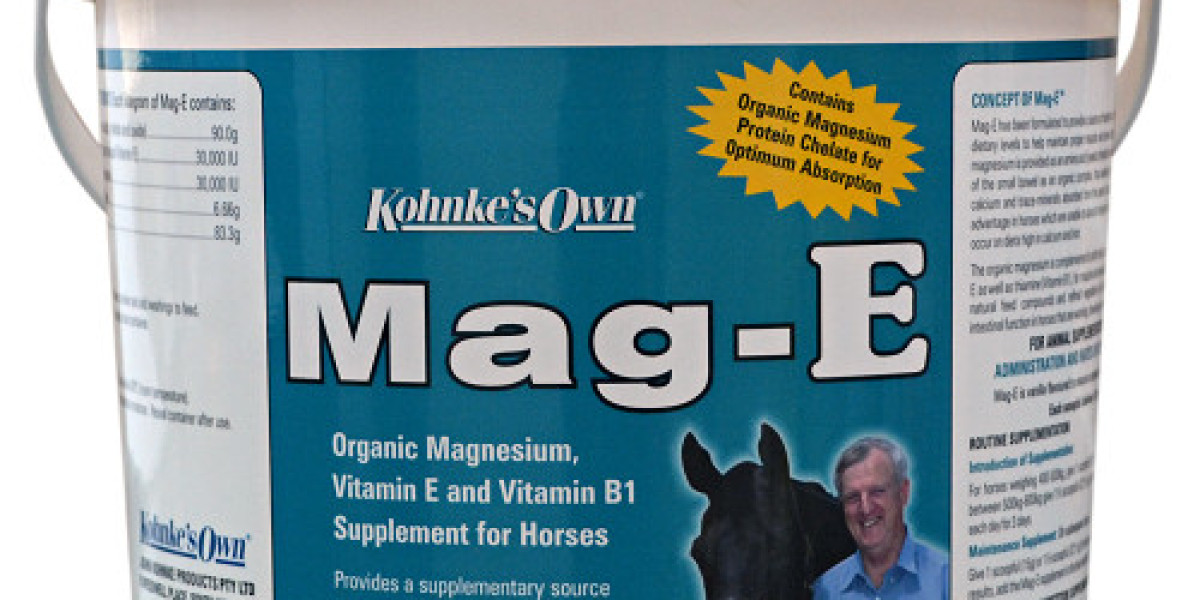Magnesium is a critical mineral that plays a vital role in maintaining the health and well-being of horses. It supports various bodily functions, including muscle function, nerve transmission, and bone health. Magnesium deficiency in horses can lead to a variety of health issues, from muscle spasms to stress and behavioral problems. To address magnesium deficiencies and promote overall equine health, many horse owners turn to supplements like Mag-E, a popular product that supports magnesium levels in horses.
In this blog post, we will explore the importance of magnesium in equine health, how it affects the body, and why Mag-E is often considered an effective solution for maintaining balanced magnesium levels in horses. We will also discuss the signs of magnesium deficiency and how supplementation can help improve the well-being of horses.
What is Mag-E?
Mag-E is a magnesium-based supplement formulated to address magnesium deficiencies in horses. It is designed to support overall equine health by ensuring that horses receive the right amount of magnesium to maintain optimal muscle function, nerve activity, and other vital processes. The "E" in Mag-E typically refers to the inclusion of Vitamin E, an antioxidant that works synergistically with magnesium to provide additional benefits for the horse, such as improved muscle function and reduced inflammation.
Mag-E is commonly used for horses that show signs of magnesium deficiency, those experiencing stress from physical exertion, or horses that are subjected to environmental stressors. It is also commonly administered to horses with specific conditions, such as muscle spasms or those suffering from a lack of relaxation or calmness. As magnesium plays a crucial role in muscle relaxation and nerve function, providing adequate magnesium supplementation can help maintain healthy muscle tone and promote calm behavior in horses.
The Importance of Magnesium for Horses
Magnesium is an essential mineral for all living creatures, and horses are no exception. It is involved in over 300 biochemical reactions in the body, which makes it essential for a wide range of bodily functions. Here are some of the key roles magnesium plays in maintaining equine health:
1. Muscle Function and Relaxation
One of magnesium's primary roles in the body is supporting muscle function. Magnesium helps regulate the contraction and relaxation of muscles, which is especially important for horses that are regularly involved in physical activities, such as racing, jumping, or long-distance riding.
When magnesium levels are balanced, it helps ensure that muscles can contract properly during exertion and relax afterward. This balance is particularly important in preventing muscle cramps, spasms, and stiffness. Magnesium supplementation can be beneficial for horses prone to muscle issues, particularly after intense exercise or training sessions.
2. Nerve Function
Magnesium plays a vital role in nerve function by supporting the transmission of nerve impulses. It helps maintain a healthy nervous system, allowing horses to respond appropriately to stimuli and experience proper muscle coordination. Magnesium is involved in the regulation of neurotransmitters, which control muscle activity and relaxation.
A magnesium deficiency can lead to over-excitability of the nervous system, which can result in behavioral issues, such as irritability or hyperactivity. Horses that are easily agitated or overly nervous may benefit from magnesium supplementation, as it helps calm the nervous system and promotes relaxation.
3. Bone Health
Magnesium is also essential for maintaining healthy bones. It works alongside calcium and phosphorus to build strong, healthy bone tissue. Approximately 60% of the magnesium in the horse’s body is stored in the bones, and it plays a critical role in bone mineralization. Without adequate magnesium, horses may be more prone to bone disorders, fractures, and lameness.
Magnesium supports the proper utilization of calcium in the body and helps maintain the ideal calcium-to-magnesium ratio, which is crucial for bone density and structure. Horses with inadequate magnesium intake may experience weak bones and are more susceptible to injuries.
4. Cardiovascular Health
Magnesium supports the heart by helping to regulate the electrical activity of the heart muscle. It helps maintain a normal heart rhythm and ensures that the heart functions efficiently. Magnesium also plays a role in dilating blood vessels and improving circulation, which is essential for overall cardiovascular health.
Magnesium supplementation can help prevent conditions related to poor heart function, such as arrhythmias or increased heart rate, and improve circulation, which is crucial for horses that are in heavy work or under stress.
Signs of Magnesium Deficiency in Horses
Magnesium deficiency in horses can lead to a range of symptoms that affect the horse's overall health and performance. Some common signs of magnesium deficiency include:
Muscle cramps and spasms: Horses with low magnesium levels often experience muscle tightness, cramping, and spasms. This is particularly noticeable after intense physical activity or during hot weather when the horse is sweating more.
Behavioral changes: Horses with magnesium deficiency may exhibit nervousness, irritability, or hyperactivity. They may become more excitable, aggressive, or harder to manage during training or handling.
Poor coat condition: Magnesium is important for overall skin health, and a lack of magnesium can lead to poor coat condition, including dullness or shedding.
Lethargy and weakness: A magnesium deficiency can cause general weakness, fatigue, and a lack of energy. A horse with low magnesium may appear sluggish and have difficulty recovering after exercise.
Stiffness or lameness: Horses suffering from magnesium deficiency may also show signs of stiffness or difficulty moving, particularly after exercise. This is due to the role magnesium plays in muscle relaxation and proper coordination.
If any of these symptoms are noticed, it is important to consult with a veterinarian to confirm whether magnesium deficiency is the issue and determine the appropriate treatment.
How Mag-E Can Help Address Magnesium Deficiency
Mag-E provides a highly bioavailable form of magnesium that can be easily absorbed by the horse’s digestive system. It is formulated to be palatable, ensuring that horses are more likely to consume it as part of their daily routine. Supplementing with Mag-E can help restore magnesium levels, preventing the negative effects of a deficiency and supporting the horse’s muscle function, nervous system, and overall well-being.
The inclusion of Vitamin E in Mag-E enhances its benefits by acting as an antioxidant. Vitamin E helps protect cells from oxidative stress and supports the body’s ability to repair damaged tissues. This combination of magnesium and Vitamin E works synergistically to promote relaxation, reduce inflammation, and improve muscle function in horses.
Mag-E can be particularly beneficial for horses under stress, such as those that are involved in intense training, competition, or those that experience anxiety due to environmental factors. It is also commonly used for older horses or those with medical conditions that require enhanced muscle and nerve function.
Using Mag-E for Prevention and Maintenance
Magnesium supplementation with Mag-E is not only helpful for addressing deficiencies but can also be used as a preventive measure. Regular supplementation with magnesium helps maintain optimal magnesium levels in the horse’s body, ensuring that muscles and nerves function at their best. This can be particularly beneficial for horses involved in regular physical activities, as magnesium helps support muscle recovery and reduces the likelihood of muscle-related issues, such as cramps or spasms.
Mag-E can be administered daily as part of a horse’s regular feed, ensuring that the horse maintains adequate magnesium levels for ongoing health and performance. When using Mag-E for preventive care, it is important to monitor the horse's response and consult with a veterinarian to determine the ideal dosage for the horse's specific needs.
Conclusion
Magnesium plays a vital role in supporting a variety of bodily functions in horses, including muscle and nerve function, bone health, and cardiovascular health. As magnesium deficiency can lead to a variety of issues, such as muscle spasms, irritability, and weakness, it is important for horse owners to ensure that their horses are receiving an adequate amount of this essential mineral.
Mag-E is a valuable supplement designed to support horses with magnesium deficiencies or those that require additional magnesium for optimal health and performance. By providing a bioavailable form of magnesium, along with the added benefits of Vitamin E, Mag-E helps to restore magnesium balance, promote muscle relaxation, reduce inflammation, and improve overall well-being.
For horses showing signs of magnesium deficiency or those in need of enhanced muscle and nerve support, Mag-E can provide significant health benefits. As always, it is essential to consult with a veterinarian before introducing any new supplement to ensure it is the right fit for the horse's specific needs.



